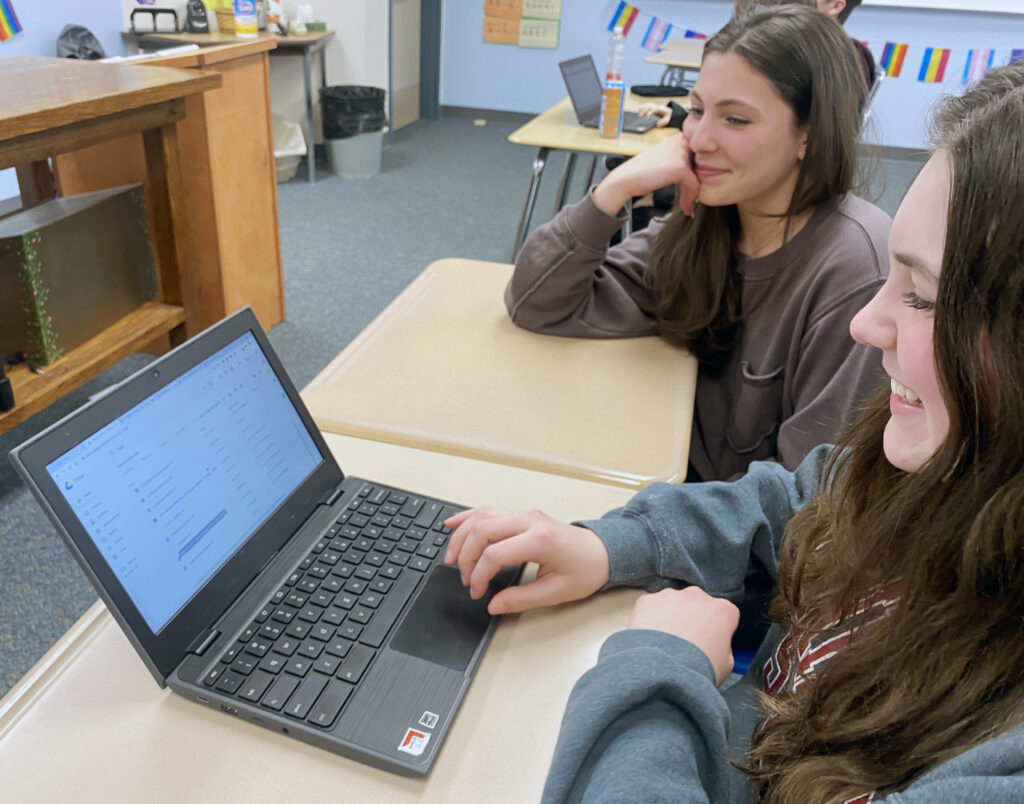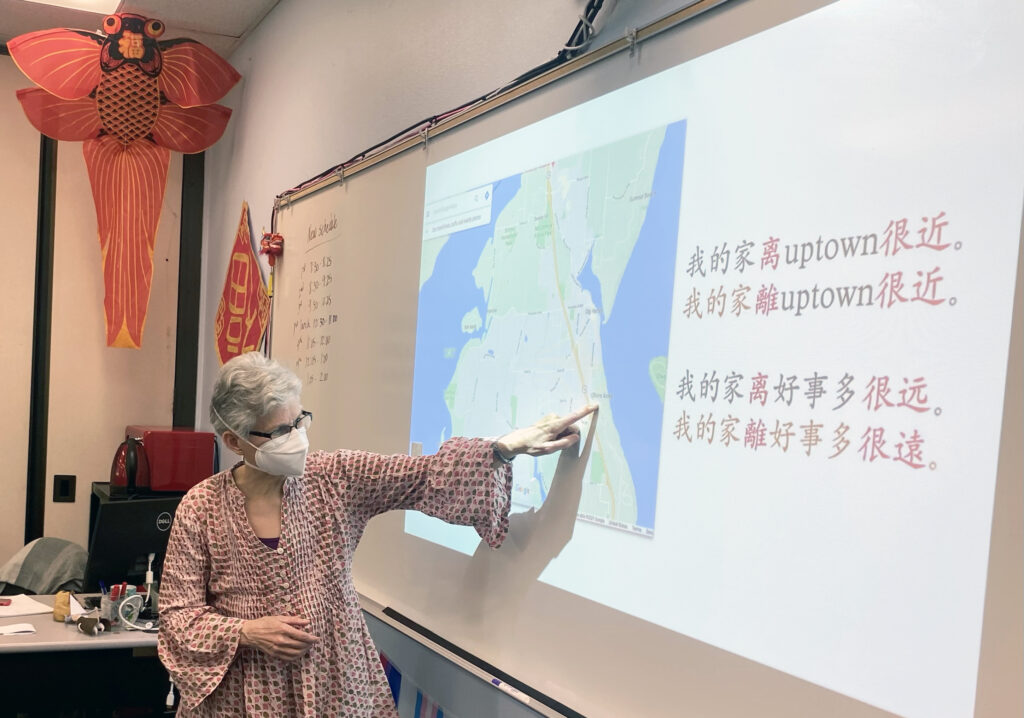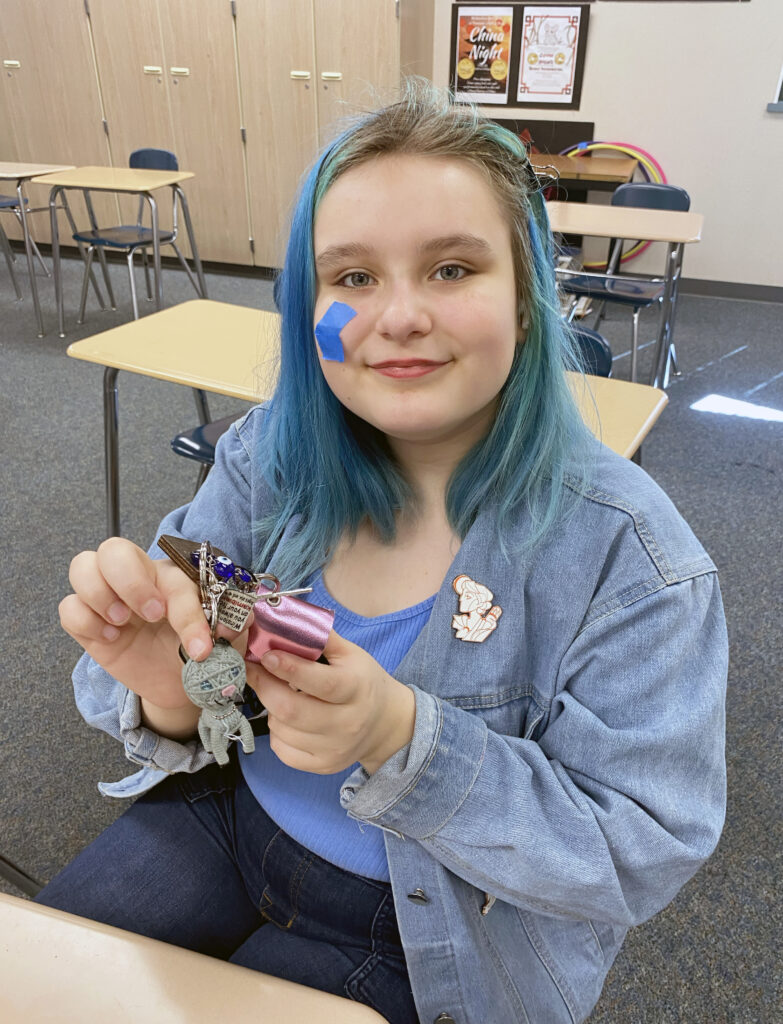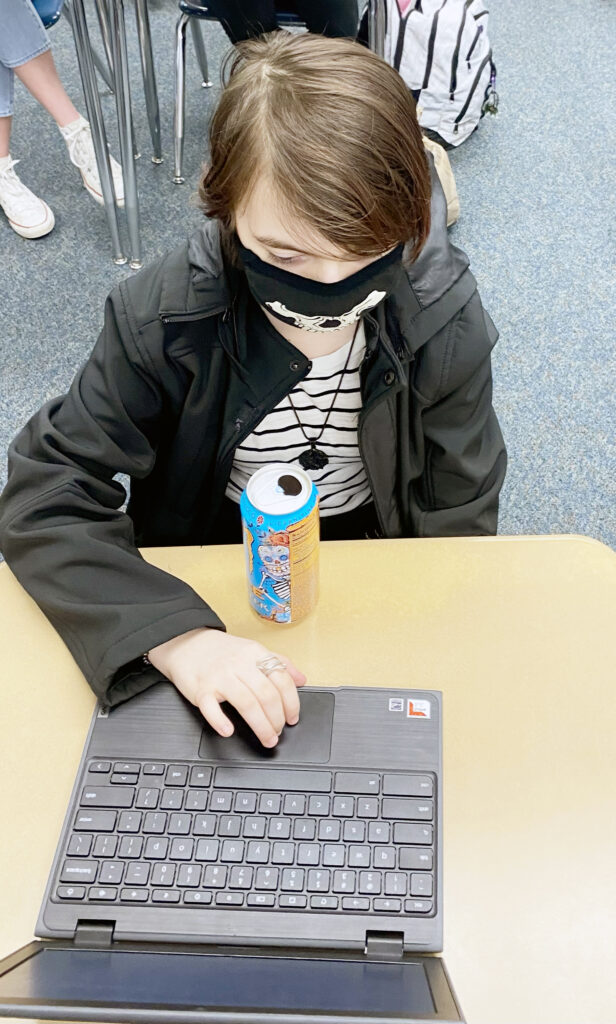Community Education
Chinese language students from Gig Harbor connect with school in Taiwan

Chinese language students Sasha Unger, front, and Mia Morente look at the Google doc Peninsula School District shares with Taipei Municipal Zhong-Lun High School in Taiwan for an online cultural exchange forum. Heidi Steele, Peninsula’s Chinese language instructor, worked with colleagues at the school in Taiwan to establish the forum in March 2022. Christina T Henry
Students at the Taipei Municipal Zhong-Lun High School are getting ready for bed around the time students in Peninsula School District arrive for their classes. But neither time zones nor distance has stopped students on both sides of the Pacific Ocean from connecting through an innovative cultural exchange.
Education Sponsor
Education stories are made possible in part by Tacoma Community College, a proud sponsor of Gig Harbor Now.
Peninsula Chinese instructor Heidi Steele has contacts in Taiwan from her years of instructor training. Roughly a month ago, she and teachers at the school in Taiwan launched an open-forum Google doc where students could post and answer questions from each other on topics such as school, family life, food, sports and entertainment.
They’ve found many similarities and some surprising differences.

Connecting across cultures
“They listen to a lot of American pop music, and so we’re able to discuss what artists and music genres that we like that we share between us,” said Justin Sass, a second-year Chinese language student at Gig Harbor High School. “There were several students that mentioned American artists, so I think it’s quite popular.”
“There’s so many different categories. I think we have nine categories now,” said Mia Morente, a third-year student. “For me, I had a question in sports. And I was talking about running and triathlon, and I found another triathlete all the way over in Taiwan, and so now I get to talk to another triathlete.”
The Taiwanese students play baseball like their American peers, but because the school is in the middle of the city of Taipei, they practice in a large “basement” area. The Taiwanese students wear uniforms and some live on campus in dorms. Peninsula students also have noticed differences in the overall education process.
“One of the questions I was asking was if the students started looking at colleges yet like we do in the U.S. around this time, and there was actually an interesting cultural difference,” said Emily Negron, a junior. “They don’t so much pick what college they want to go to so much as the department they’re interested in. It matters more which fields and department they’re looking at, and the colleges, depending on their grades, pick them rather than the other way around.”
Hundreds of questions and answers have been logged since the online forum was launched in March. New chat threads appear daily.
Taipei Municipal Zhong-Lun High School includes students at both the middle school level and high school levels. In Peninsula School District, participation in the online forum is open to Chinese language students from Gig Harbor High School and Kopachuck Middle School.
Peninsula School District won’t be offering Chinese at the middle school level next year, however. District officials cite low enrollment. Nor will Chinese classes be taught at Peninsula High School. The district is looking at ways to allow PHS students who want to study Chinese to access classes at Gig Harbor High.
How the exchange works
The Taiwanese students type questions into the forum in English and receive replies in English. Gig Harbor and Kopachuck students ask questions in Chinese and get replies in Chinese. There’s usually a lag because of the time difference, but night owls like Ash Curette have been able to chat in real time with students in Taiwan.
Curette, a second-year Chinese student at Gig Harbor High School, pulled up the Google doc during a class last week and cited a discussion thread he started recently about anthropology.
“As you can see, there’s plenty of other questions here that we have asked and gotten responses to,” Curette said. “And if you go down to the English section, it’s asking, like, ‘We have a lot of pressure. Do you feel pressure?’ And we responded to that.”
The Peninsula students were asked if they go to “cram schools.”
“Yeah, in Taiwan, education is stressed,” Curette said. “I would say personally, that it’s stressed a lot more than it is here. They have really big exams. And so, a cram school is just a way for them to study more.”
In another recent discussion, a Taiwanese student asked if the U.S. students brought “dolls” to school, causing some to do a double take. Turns out, small keychain ornaments referred to as “dolls” are popular in Taiwan. Gig Harbor student Izaer Marquez has a keychain doll called “Winston” and was able to share that with the students in Taiwan.

Chinese language student Izaer Marquez shows off “Winston,” their keychain ornament similar to the keychain “dolls” (娃娃 pronounced “wá wa”) that are popular among students at Taipei Municipal Zhong-Lun High School in Taiwan. Students from Peninsula School District have an online cultural exchange forum with students at the school in Taiwan. Christina T Henry
Next-best thing to being there
Steele has tried having pen pals in the past, but where some students got immediate replies, others got none. The forum is more of a free-flowing discussion where students can jump in as they like.
A number of years ago, Steele coordinated student travel to Chinese-speaking countries at first through Peninsula School District and later directly with a partner school in Taiwan. Those trips were curtailed due to global tensions, the pandemic and Steele’s health (she was in treatment for cancer beginning in 2018). Students lost out on an opportunity to use their language skills outside the classroom.
“And I just thought, oh my God, my students are missing this real communication,” Steele said.
Short of travel to Taiwan, the forum is the next best thing. Peninsula students have expressed an interest in connecting with their Taiwanese friends on social media outside of the Google doc forum or at least doing more personalized exchanges, perhaps with photos. Steele is looking in to how to make that happen.
Taiwan, a self-governing island, has access to social media platforms not available in the People’s Republic of China.
The challenging Chinese language
Chinese is challenging on a number of levels, Steele’s students say. It’s not a phonetic language but rather meaning-based, Steele explained. Instead of an alphabet, there are characters.
“Each character has a meaning, and there are thousands and thousands and thousands of characters,” she said.
In addition, there are five tones that can be applied to characters. Words with similar characters can have different meanings depending on the tone with which they are spoken.
Steele started studying Chinese at age 12. Developmentally, after that age, hearing and producing the subtle difference in tones becomes increasingly difficult, she said.
“Chinese isn’t difficult per se, but it takes a long time,” Steele said. “So, my students who go four years here and then study intensively for four years in college and spend some time in China or in Taiwan will come out at a native speaker level after that.”
While all students in Taiwan are required to take English, Peninsula students have a choice.
Those who sign up for Steele’s classes tend to be curious, avid learners, she said. They are an eclectic bunch “from across the academic spectrum.”
“I got into Chinese mainly because I want to be polyglot and know just as many languages as possible,” Marquez said. “And I felt that Chinese, given its difficulty and the necessity to be able to differentiate and understand tones made it a nice jumping off point.”
“I’m hoping to go into international marketing as a major and I felt that Chinese would be a useful skill to have,” said Sass.
Understanding a culture
Jackson Keeton, a first-year student, expects it will be helpful because he plans to major in engineering and work overseas.
Maddie Powell, in second-year Chinese at Gig Harbor High, lived in Hong Kong for seven years.
“I took it there, so now’s my first year taking it in school here. But I have some background,” she said.
Like a number of Steele’s students, Taylor Sletner was introduced to Chinese as an option in middle school. Her father told her it was the second most-widely spoken language in the world. She hopes it will be useful when she travels.
Steele’s students say the class has broadened their global perspectives.
“Like most of my family, I didn’t really hear positive stuff about China or Chinese culture,” said Curette. “So, I think being able to learn Chinese, I’ve been able to, like, learn past some of the bigotry that I’ve been taught.”
Gannon Erickson, a second-year student, said: “Since taking the class, I kind of steered away from sort of looking at China as just the face of the country, the People’s Republic of China, and sort of being able to identify that there’s a certain distance between what the government presents towards every other country and what the individuals living in China actually believe and support.”
“I just think it’s really important to be able to communicate with other people and understand them and their culture,” Joseph Sokol said.
Parents not happy with program cuts
Peninsula School District began offering middle school Chinese in the 2017-18 school year at Kopachuck and Harbor Ridge Middle School.
“Since that time, enrollment numbers have declined and stayed low at both schools,” said Dan Gregory, assistant superintendent for secondary education, explaining why the district plans to end middle school classes.
“The number of students consistently enrolled at Kopachuck has been roughly half, or less than half, of regular middle school class sizes,” Gregory said. “Harbor Ridge has not offered Chinese language classes the past two school years due to low registration numbers. Unfortunately, the district is not able to continue to staff classes with such low enrollment.”
Gregory said Chinese will continue at Gig Harbor High School in the 2022-23 school year but will be discontinued at Kopachuck, where Steele teaches, and Peninsula High School, where Chinese is taught by another teacher. The district is looking into ways for Peninsula High School students to access courses at Gig Harbor High.
Parents decried the upcoming cuts in comments on a recent Facebook post by the district highlighting coverage of Steele’s cultural exchange in the Peninsula Gateway. One parent called the district’s decision “heartbreaking.”
‘He loves his class’
Kristi Fischer was among several parents commenting on the post who said she had not heard the news that middle school Chinese was to be discontinued.
Fischer said she felt lucky her son Cole, now in eighth grade at Kopachuck, will get to continue with Steele as a Gig Harbor High freshman next year.
Fischer told Gig Harbor Now said the cultural exchange has been a highlight for her son Cole.
“He absolutely loves his class,” she said. “It is his favorite class. Every day we (my husband and I) get to hear about what he is learning. The recent communication with the students from Taiwan has just increased his enthusiasm for the class.”
Like others, Fischer had high praise for Steele and the vibrant program she has built over the years.
“I think it’s really unfortunate that the kids at Kopachuck and then also the ones at Peninsula won’t have access to that because it really is a unique program, and she’s a wonderful teacher.”
Steele, addressing enrollment, said her classes never have been packed.
“Chinese is not an easy way to meet the two-years-of-a-language requirement for many colleges and universities,” she said. “For many of the students who decide to take the plunge, learning Chinese becomes a tremendously meaningful experience – I think this is due in part to my efforts to make it real.”
Cultural connection
Steele in the past has hosted Chinese culture events within the school district and has organized culture “immersion” events outside of school.
The last several years were anomalous, Steele said, with staff turnover, her health issues and the pandemic. Remote learning made tackling a complex subject like Chinese dramatically harder.
Steele is “saddened” by the district’s decision, especially with a semblance of normalcy emerging and her health issues resolving. She understands the district’s budget pressures driven by enrollment but said middle school classes gave students “a head-start on Chinese while the window to easily learn a tonal language is still wide open — and to thus compete on more equal footing with their peers around the country who have the benefits of immersion programs, and elementary and middle school world language programs.”
Global trends and tensions are all the more reason to embrace a cultural connection, Steele said.
“At a time when China is emerging as a power challenging the U.S. on the world stage, we would be wise to be moving towards China, not away,” she said. “Our children will have a growing need to understand China. The oft-quoted advice to ‘keep your friends close and your enemies closer’ has never been more relevant.”
Steele cites the success of Peninsula’s Chinese language program. It is nationally recognized and has served students well both academically and professionally.
“I hope it survives,” she said.


